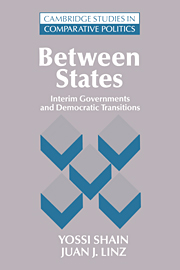Book contents
- Frontmatter
- Contents
- Preface
- Contributors
- PART ONE THEORY
- PART TWO CASE STUDIES
- 7 The provisional government and the transition from monarchy to Islamic republic in Iran
- 8 From revolution to democracy in Portugal: The roles and stages of the provisional governments
- 9 Accelerating collapse: The East German road from liberalization to power-sharing and its legacy
- 10 Interim government and democratic consolidation: Argentina in comparative perspective
- 11 The failure of an internationally sponsored interim government in Afghanistan
- 12 Electoral transitions in Yugoslavia
- 13 Democratization and the international system: The foreign policies of interim governments
- Index
8 - From revolution to democracy in Portugal: The roles and stages of the provisional governments
Published online by Cambridge University Press: 05 August 2012
- Frontmatter
- Contents
- Preface
- Contributors
- PART ONE THEORY
- PART TWO CASE STUDIES
- 7 The provisional government and the transition from monarchy to Islamic republic in Iran
- 8 From revolution to democracy in Portugal: The roles and stages of the provisional governments
- 9 Accelerating collapse: The East German road from liberalization to power-sharing and its legacy
- 10 Interim government and democratic consolidation: Argentina in comparative perspective
- 11 The failure of an internationally sponsored interim government in Afghanistan
- 12 Electoral transitions in Yugoslavia
- 13 Democratization and the international system: The foreign policies of interim governments
- Index
Summary
INTRODUCTION
Portugal was the first of the current and continuing transitions from authoritarian to democratic regimes. It is particularly significant in this study as it is the only successful transition which also underwent a revolution, transforming not only political but also economic and social structures. In the terms of the editors, it was a revolutionary provisional government that emerged after the overthrow of the ancien régime. The overthrow, in the form of a military coup, led to a revolution in which radical elements were ascendent during five of the six provisional governments between April 25, 1974, and June 1976. Moderate elements finally prevailed, however, and a democratic regime was established that continues to manifest the structures and processes of its founding. Indeed, the patterns established and issues raised during the provisional governments continue to define politics until the present. My purpose here is to briefly describe the political chronology of the twenty-seven month period of the provisional governments and explain how the revolution resulted in a democratic regime. The review of patterns and issues will bring the discussion up to the present. The perspective taken will focus on the processes of the provisional governments which were both the results of and led to democracy in Portugal.
BACKGROUND
On April 25, 1974, a group of approximately two hundred junior officers gathered together in the Armed Forces Movement (MFA) overthrew the government of Marcello Caetano, thereby bringing to an end the Estado Novo created by António de Oliveira Salazar in 1930 and overseen by him until his incapacitation in 1968.
- Type
- Chapter
- Information
- Between StatesInterim Governments in Democratic Transitions, pp. 144 - 159Publisher: Cambridge University PressPrint publication year: 1995
- 2
- Cited by



